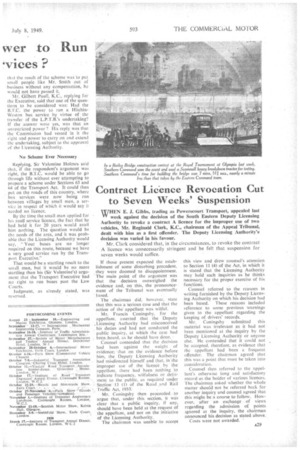Contract Licence Revocation Cut to Seven Weeks' Suspension
Page 5

If you've noticed an error in this article please click here to report it so we can fix it.
WHEN E. .1. Gibbs, trading as Powerscourt Transport, appealed last vv week against the decision of the South Eastern Deputy Licensing Authority to revoke a contract A licence for the improper use of two vehicles, Mr. Reginald Clark, K.C., chairman of the Appeal Tribunal, dealt with him as a first offender. The Deputy Licensing Authority's decision was varied in his favour.
Mr. Clark considered that, in the circumstances, to revoke the contract A licence was unnecessarily stringent and he felt that suspension for seven weeks would suffice.
If those present expected the establishment of some disturbing precedent, they were doomed to disappointment. The main point of the argument was that the decision outweighed the evidence and, on this, the pronouncement of the Tribunal was eventually based.
The chairman did, however, state that this was a -serious case and that the
• action of the appellant was wilful.
Mr. Francis Coningsby. for the appellant, asserted that the Deputy .Licensing Authority had misconceived his duties and had not conducted the public inquiry, at which the case had been.heard, as he should have done.
Counsel contended that the decision had been against the weight of evidence; that on the evidence before him, the Deputy lidensing Authority had misdirected himself and that, in the improper use of the licence. by the appellant, there had been nothing to indicate frequency. wilfulness or detriment to the public, as required under Section -13 (I) of the Road and Rail Traffic Act, 1933: Mr. Coningsby then proceeded. to argue that, under this section, it was clear that a public inquiry, if any, should have been held at the request of the appellant, and not on the initiative of the Licensing Authority.
The chairman was unable to accept this view and drew counsel's attention to Section 11(4) of the Act, in which it is stated that the Licensing Authority may hold such inquiries as he thinks necessary for the proper exercise of his functions.
Counsel referred to the reasons in writing furnished by the Deputy Licensing Authority on which his decision had been based. These reasons included ieference to some previous warnings given to the appellant regarding the keeping of drivers' records.
Mr. Coningsby submitted this material was irrelevant as it had not been mentioned at the inquiry by the Deputy Licensing Authority or anyone else. He contended that it could not be accepted, therefore, as evidence that the appellant had been a frequent offender. The chairman agreed that this was a point that must be taken into consideration.
Counsel then referred to the appellant's otherwise long and satisfactory record as the holder of various licences. The chairman asked whether the whole matter should not be referred back for another inquiry and counsel agreed that this might be a course to follow. However, after anexchange of views regarding the admission of points ignored at the inquiry, the chairman announced hisdecision as statedabove.
Costs were not awarded. '


























